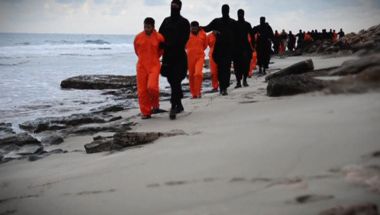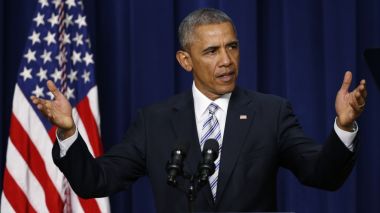In review: the five biggest stories of the week
1. Islamic State beheaded 21 Coptic Christians in Libya

In a video that shocked the world, Egyptian Christian workers in Libya captured by Islamic State were shown being beheaded in a grisly piece of theatre. Several of them were seen to whisper the name of Jesus as they died. Egypt's Copts face discrimination and marginalisation, but for once the country was united in outrage for them: Egyptian warplanes bombed Islamic State targets in revenge.
Other reactions were heart-stoppingly humbling. The brother of two of the men, Beshir Kamel, prayed for their killers on live TV and said that their declaration of faith had strengthened his own.
2. Obama struggles with Islam rhetoric

The Libyan murders have once again highlighted the evils of the Islamic State ideology and led to a difficult week for President Obama. He has faced criticism for describing the 21 murdered Copts as "Egyptian citizens" rather than "Christians", with right-wing critics saying he is soft on Islam and probably a Muslim himself. In a speech on Wednesday he said: "We are not at war with Islam. We are at war with people who have perverted Islam." However, evangelist Franklin Graham, reiterating his well-known opinions of Islam, criticised Obama for failing to "acknowledge the truth and call Islamic extremism what it is". There are continuing genuine questions about just how "Islamic" Islamic State is – a much-critiqued article by Graeme Wood in The Atlantic argues that in its own terms it is behaving perfectly reasonably, for instance – but Obama is determined not to use the incendiary rhetoric of some ideological hawks.
3. Ash Wednesday goes viral

The beginning of Lent this year was notable for the number of selfies taken by people with ash on their foreheads, and for the sight of bishops going out into the highways and byways offering to perform the ritual on passers-by. Whether it was as spiritually edifying as it might have been has been much debated, but since we have Twitter, Facebook and camera phones, the phenomenon is probably here to stay.
4. Bishops clash with politicians over election letter... but it shows the Christian voice matters

A row about Christians and politics was touched off by a fairly innocuous 'pastoral letter' released by Church of England bishops encouraging people to vote in the next election and warning against supporting parties for self-interested reasons. Conservatives in particular weighed in against the bishops, accusing them of being party political and talking about things they didn't know anything about. Work and Pensions Secretary Iain Duncan Smith mocked the Church's "dwindling relevance", though Russell Brand said he agreed with the Church that politics was "broken".
Separately, a survey from the Evangelical Alliance found that evangelicals were more likely to vote than the rest of population though still didn't trust politicians very much. The furore over the bishops' letter arguably exposed – again – the religious illiteracy of many journalists and politicians. However, the rabid hostility expressed towards them is also interesting because it shows that far from being irrevelant, their views are still regarded as newsworthy.
5. Oborne takes on the Telegraph
A highly religiously-literate and very widely-respected journalist made news this week with his resignation. Daily Telegraph journalist Peter Oborne had been unhappy with the direction the Telegraph was taking for some time andagreed a quiet parting of the ways with his employer. However, its failure, as he saw it, to give adequate coverage to the HSBC tax evasion scandal led him to tell the public exactly why he was going: apart from a general decline in standards, there had been undue influence on editorial decision by the advertising department. It is an issue not just for major newspapers but for Christian news outlets as well, as Martin Saunders points out for Christian Today – and, indeed for churches. He who pays the piper calls the tune – but "A Christian media that can be 'bought' begins to set a vision that has been paid for, and turns a blind eye to the areas of the house that need to be put in order."
A good week for:
Martin Luther, whose Playmobil doll is the fastest-selling ever.
A bad week for:
Chelsea fans, some of whom were filmed chanting racist abuse on a Paris Metro station.
The story you might not have read, but ought to know about:
The Children's Society has warned that older children are at the greatest risk of abuse and neglect.
And one for pure enjoyment:
A man sent a letter to Jesus – and got a reply.











